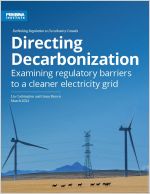
On behalf of the Pembina Institute, Carolyn Kim and Maddy Ewing submitted comments in January, 2021, to the Ontario Ministry of the Environment, Conservation and Parks, following a request for feedback that will inform the province’s first ever hydrogen strategy.
Pembina Institute supports the government of Ontario’s efforts to create a low-carbon hydrogen strategy, and encourages the Ontario government to assert that the ultimate goal of its strategy is to achieve significant GHG emissions reductions in hard-to-abate sectors. In doing so, a hydrogen strategy can be a key lever to help Ontario achieve its 2030 climate target and reach net-zero by 2050.
Interest is growing in the potential role for zero- and low-carbon hydrogen on pathways to net-zero emissions. Only a fraction of hydrogen used today around the world is produced without GHG emissions. A number of jurisdictions are already exploring the possibility of adopting a GHG intensity threshold for hydrogen to be deemed “low-carbon.”
Hydrogen’s greatest value may lie in its potential to reduce carbon pollution from hard-to-decarbonize sectors and particularly energy intensive end uses, such as high-heat industrial processes and long-haul heavy-duty freight transportation where there may be limitations to battery electric technologies. Hydrogen can also be used in the production of fuels made by synthesizing (or combining) different types of gases.
Hydrogen, however, is not a one-size-fits-all solution for reducing greenhouse gas (GHG) emissions.
In order for Ontario to achieve the full decarbonization potential of hydrogen, its hydrogen strategy must support and advance an ambitious climate plan and must also form a part of a longer-term energy plan. A robust zero- or low-carbon hydrogen strategy should, at a minimum, include a comprehensive analysis that identifies the sectors that will most benefit from hydrogen deployment, introduce policies to encourage hydrogen production and use, account for regional contexts, and include an investment component that identifies funding for the research and commercialization of new and cost-effective technologies and infrastructure.
Recommendations
As the federal government has recently released the Hydrogen strategy for Canada, and other provinces are in the midst of developing their own strategies, we encourage Ontario to work with its federal and provincial counterparts when developing and implementing the strategy.
More specifically, we offer 10 recommendations on how the province can create a strong low-carbon hydrogen strategy. Those recommendations are:
- Define a declining GHG emission intensity threshold for hydrogen to be deemed “low-carbon” that approaches near-zero by 2030.
- Establish a standardized methodology to estimate the life cycle GHG emission intensity from existing and emerging hydrogen production pathways.
- Assess the life cycle impacts of existing and upcoming hydrogen production techniques on the environment and communities in Ontario.
- Evaluate hydrogen in comparison to emerging or incumbent technologies or other fuels across various sectors to prioritize the best end uses of hydrogen.
- Assess the ability for hydrogen blended with natural gas to achieve meaningful GHG emission reductions.
- Identify financial investments and training programs needed to support the development of zero-emission vehicle technologies, including hydrogen fuel cell vehicles.
- Examine the opportunities to invest in power-to-gas facilities to take advantage of excess renewable electricity production in Ontario that would otherwise represent lost revenue for electricity generators.
- Examine the opportunities to fund demonstration projects to prove the reliability of hydrogen and fuel cell technology.
- Set clear timelines for the price on carbon and support the rollout of Canada’s forthcoming Clean Fuel Standard.
- Introduce sector-specific regulations, incentives, and an investment and infrastructure plan to support the appropriate use of hydrogen in certain sectors and end uses.
Download the submission for the full details of the recommendations and sources.


